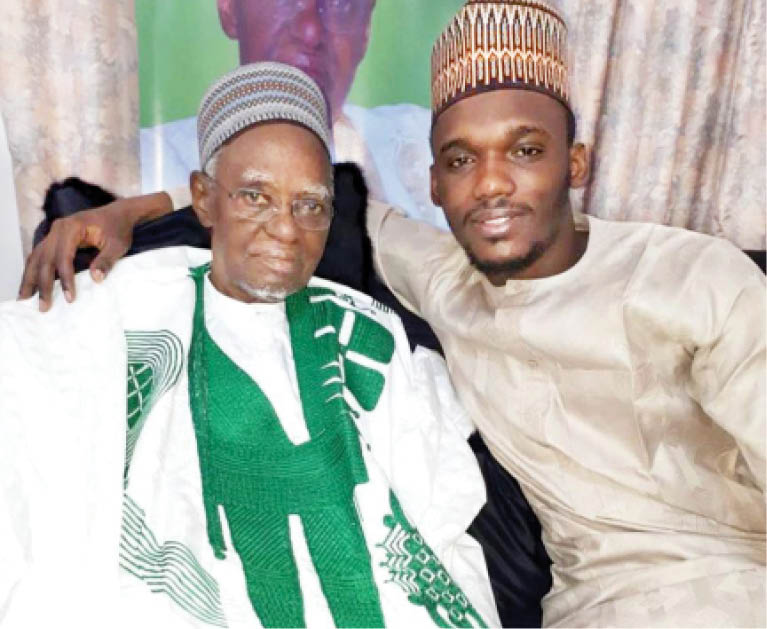‘The kind of grandfather Shagari was’
30-year-old Bello Shagari, President of the National Youth Council of Nigeria (NYCN), is the grandson of the late former President Shehu Shagari who passed away last week. In this interview, he speaks about his grandfather, how he shaped his life and other aspects of the late ex-president’s role in his life. Excerpts: Daily Trust: […]

Bello with his grandfather, Shehu Shagari
30-year-old Bello Shagari, President of the National Youth Council of Nigeria (NYCN), is the grandson of the late former President Shehu Shagari who passed away last week. In this interview, he speaks about his grandfather, how he shaped his life and other aspects of the late
ex-president’s role in his life. Excerpts:
Daily Trust: How would you describe your late grandfather?
Bello Shagari: He was very unassuming, principled, simple and elegant. It’s not always common to bring simplicity and elegance together, but he was able to do that. He also believed in fate, and I’m doing my best to emulate him in that. He was my mentor directly and indirectly, and I learnt so many things from him.
DT: What are the earliest memories of him which you can recall?

Shagari: When I was young, he referred to me as his “little secretary”, because most of the time I typed his speeches whenever he was going to events. So those moments always come back to me. He never sent me to anyone for anything, but whenever dignitaries came to visit him, he would introduce me as his grandson and his little secretary. In fact, that is why Gen. Yakubu Gowon also calls me his little friend.
The most memorable moment for me is when I read out his autobiography to him and he explained some things to me. Such experiences really got me to bond with him during his later years. Those are the moments that always come back to me whenever I remember him.
DT: What qualities of his would you say you have imbibed?
Shagari: Maintaining the truth, even when it wouldn’t be favourable to me or anyone else. He was very great at doing that. Some people don’t even like him for that reason, because he embarrassed many of them on that ground. He didn’t compromise the truth.
I would also like to be as contented as he was. He didn’t ask for much, but he got more than he asked for. I wonder how he did that. He was never been ambitious to occupy higher positions, but yet occupied the highest office in the land: President of the Federal Republic of Nigeria.
DT: What part of his personality would you say most people don’t know?
Shagari: His optimism about Nigeria and love for Africa. You would never hear him say anything negative about Nigeria. People have forgotten how much he fought for the black race. It is something he was so passionate about even before he became president.
I saw in some of his files his correspondences with the British Prime Minister, Margaret Thatcher, how he put the Nigeria/British relationship on the line because of Zimbabwe. And when they got their independence in 1980 when he was president, he pledged $15m at the celebration to train Zimbabweans in Nigeria. Mugabe’s government used part of the money to buy newspaper companies owned by South Africans, thereby increasing the government’s control over the media. The rest went to training students in Nigerian universities, government workers in the Administrative Staff College of Nigeria in Badagry and soldiers in the Nigerian Defence Academy (NDA) in Kaduna.
Strangely, he is late now and I’m yet to hear a single word of condolence or tribute from Zimbabwe.
My late grandfather also relished his freedom more than anything. Thus, when he retired from politics, he stayed away from national politics. I remember, during Abacha’s time, he wanted to make him the Chairman of African Petroleum (AP), but he refused the offer, saying he wanted to rest. He always wanted to be free. He lamented in his book, Beckoned to Serve, that he wanted freedom, but throughout his life, he was in service. And even when he retired from national politics, he was not allowed to rest.
But some of the things he got involved with were less demanding. Most of the political statements made in his name were purported, and he often didn’t know because he had retired himself from reading newspapers in protest of things that were written about him after his removal from office. He felt many lies were orchestrated against him on the pages of the newspapers.
DT: Would you say he inspired you to take on a leadership role?
Shagari: One thing that makes me happy is that he saw me through before he died in the sense that he inspired me to serve, and with such inspiration, I became the President of the National Youth Council of Nigeria (NYCN) before his own eyes. And the only thing he gave me was goodwill and prayer, not money or a letter to anybody. I may not be his successor in politics, but I’m glad he was alive to see me get to where I am today. Alhamdulillah!
